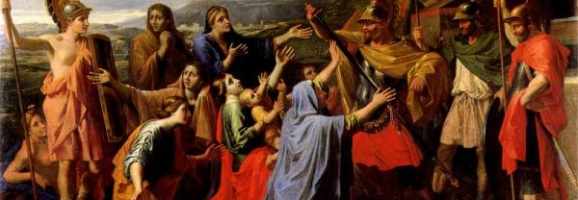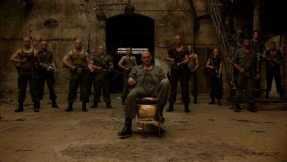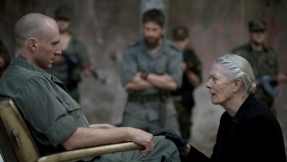Fatherly Mothering: Masculine Volumnia, a Martial and Political Woman

This month marks the 450th birthday of William Shakespeare. Very few playwrights have had as much impact on literature and popular culture than Shakespeare. In honor of his birthday, I’d like to discuss one of his plays that doesn’t get as much attention as some of his others. Yet, it is one of my favorites. That play is Coriolanus. Specifically, I’m going to look at Coriolanus’s mother, Volumnia, how she’s presented as a masculine character, and how that affects Coriolanus.
In Shakespeare’s Coriolanus, Volumnia displays an ingrained martial characteristic that challenges her femininity. She is seen as a masculine character, and as a result, she is more of a father to her son, Coriolanus, than a mother. It is in this that we see an imbalance in her parenting — when it comes to her son, she is wholly patriarchal and not at all matriarchal. In both the original text and most recent 2011 film version of the play, there are numerous ways in which Volumnia is portrayed as masculine. These include, but are not limited to, her clothing, speech, and beliefs. Her fathering nature (or, her lack of feminine influence on her son) shapes Coriolanus as a person. The influence of her masculine values (i.e., her staunchly militaristic stance on Roman life) has consequences that ultimately leads to her son’s death. Put another way, her “mothering,” in all forms of its masculinity, indirectly kills Coriolanus. Rearing her child in the ways she views as appropriate turns out to be Coriolanus’s downfall.
Shakespeare depicts Volumnia as completely eschewing femininity throughout Coriolanus by showing her not only as a highly martial character but also as a highly political character. In fact, Volumnia is so involved in politics that feminist critic Maria Álvarez Faedo says in her essay “Re-visions of Volumnia’s Motherhood” that Volumnia is “aware … of the ubiquitous plots and treachery within the world of Roman politics” (27). This is a man’s arena, but Volumnia knows the ins and outs of it.
Volumnia is frequently contrasted with the more feminine Virgilia, her daughter-in-law. Álvarez Faedo says, “Virgilia is the embodiment of Roman and Renaissance domestic virtues as Volumnia is the female embodiment of public virtues” (32). Typically, the domestic sphere of society was the “female” sphere, while public virtues links to the political sphere of society, which was the “male” sphere. Given her great love, involvement, enthusiasm, and influence in war and politics, Volumnia is completely steeped in the political sphere, thus associating her more with masculinity. We can see Volumnia as masculine through her association with politics because the play uses masculine language to describe politics. When speaking to the citizens, Menenius describes the consul as a body and rightfully says the patricians are members of the body (1.1.85). But this also brings up images of a physical body and the patricians being members (i.e., penises) of that body. Because of her involvement in politics, Volumnia becomes associated with masculinity through the imagery of a penis. Also when talking to the citizens, Menenius says:
You are transported by calamity Thither where more attends you, and you slander The helms o’th’ state, who care for you like fathers, When you curse them as enemies. (1.1.66-69)
Menenius explicitly uses language associating politics with masculinity by saying the consul cares for the citizens like fathers. Volumnia’s immersion in the political culture has caused her to be nothing but a father to Coriolanus.

Virgilia is presented as the standard of femininity, and is so antithetical to Volumnia as to definitively not mistake Volumnia’s masculinity. When issues regarding Coriolanus and war arise, Volumnia praises the idea and action of battle, as well as praises Coriolanus’s physical wounds, while Virgilia worries for her husband. Virgilia’s fears are considered, as George Gerwig notes in his book Shakespeare’s Ideals of Womanhood, to be “characteristically feminine” (224), and this assessment is still widely held today. As he says of Virgilia, “It is the living, concrete man she loves, not the abstract ideal of patriotism” (225). However, being the staunch supporter of Rome she is, Volumnia is especially concerned with patriotism. To her, patriotism should be the primary concern of Roman citizens. Their different value systems are chief amongst their symbolic gender divides, and the feminine/masculine juxtaposition between Virgilia and Volumnia is shown largely when Volumnia strongly criticizes Virgilia. After Virgilia cries out she wishes Coriolanus would return not bloodied or scarred, Volumnia chastises, “Away, you fool! It more becomes a man / Than gilt his trophy” (1.3.36-37). Volumnia’s declaration that Virgilia is a “fool” is indication that she is upset with Virgilia for not understanding the importance of war and its signification for the overall importance of Rome. The use of “fool” returns later when Cominius says:
Breathe you, my friends, Well fought. We are come off Like Romans, neither foolish in our stands Nor cowardly in retire. (1.7.1-3)
There is a link between Cominius’s use of “fool” and Volumnia’s use of “fool.” Since Cominius says that Romans are not foolish, when Volumnia calls Virgilia a fool, it is as if she is calling her un-Roman — a rather huge insult in Volumnia’s eyes. It is her unwavering patriotism for a patriarchal society that aligns Volumnia with masculinity.

It is not only in text where Volumnia’s masculinity is prevalent. Due to being noticeable in written form, her masculinity also translates to film adaptations. In Ralph Fiennes’s 2011 film of Coriolanus, Volumnia’s masculinity is visually most striking in her clothing. There is nothing typically feminine about her clothes. She wears suits of muted colors (mainly gray and black). Her clothing is so similar to that of the other men in the film, that when she is standing amongst them, it is actually quite difficult to distinguish her from them based on the similarity of their clothing. And not only does her clothing make her masculine, it also reinforces Volumnia’s martial characteristic, as her clothing is not simply men’s suits, but more specifically the style of the military clothing the men wear. At the moment when Coriolanus is returning victorious from battle, Volumnia is rather indistinguishable from the men. She is dressed in a gray, tailored suit, black gloves, buttoned suit coat, collared shirt, a tie, polished, black shoes, and is adorned with a military badge/metal.
Just like many critics note the contrast between femininity and masculinity with regard to Virgilia and Volumnia, the film, too, also plays with this contrast. As already stated, Volumnia is clothed in masculine garb, so this automatically sets up a distinction between her and Virgilia, who is seen in much softer, more feminine clothing. Comparing Virgilia to Volumnia’s aforementioned description, Viriglia is wearing a plain, demure dress, high heels, carrying a purse, and her long hair is styled in a feminine fashion with bangs.
But their symbolic gender separation goes beyond the strictly physical and spills over into the emotional realm. Perhaps the most notable instance in the film is when Coriolanus is marching in after battle to be recognized by the consul. We see Virgilia take on the more feminine role as she is crying when Coriolanus enters, both because she does not like the idea of war, but also because she is happy that her husband is safe. Standing next to Virgilia is the more masculine Volumnia, who is standing at attention, saluting Coriolanus, and proudly basking in his military victory — all without shedding one tear like her daughter-in-law. Virgilia’s tears could be seen as a sign of weakness in military matters. But Volumnia’s overt pride regarding all things martial is on full display, minimizing Virgilia’s feminine “weakness.” We can see this minimization occurring as Volumnia is standing in front of Virgilia and commands our attention through her actions much more than Virgilia does. Volumnia’s salute especially shows her masculine nature as the only others saluting Coriolanus are men; none of the women in this scene salute Coriolanus when he enters.
Clearly Volumnia is a masculine character, but her inherent masculinity creates an imbalance in her parenting, and she becomes more of a father to Coriolanus than a mother. Because Volumnia is so heavily influenced by patriarchal ideals, there is no doubt she would impart the same ideals into her son in his upbringing. Coppélia Kahn, in Roman Shakespeare, lists scenarios where masculine females were not judged as harshly for being manly. She says that the constraints were “eased only for women who avoid motherhood. Virgin warriors … Joan of Arc, instruments of a higher power … Amazons…” (145). However, Volumnia was not someone who avoided motherhood — not in the physical sense, at least. She was not a virgin warrior. She was not Joan of Arc 2.0, an instrument of a higher power, or an Amazon woman. She had a child and raised that child, but still remained masculine. Because of this, she would have been perceived to be more male than female, and she reared her child as such.
Exerting her paternal influence over Coriolanus, she sways him in his boyhood and continues to do so in his manhood. From the time Coriolanus was a child, to the time he is an adult, Volumnia had been the guiding female and male force in his life. We can see Volumnia’s influence over Coriolanus in his boyhood when she says:
When yet he was tenderbodied and the only son of my womb, when … a mother should not sell him an hour from her beholding, I, considering how honour would become such a person … was pleased to let him seek danger where he was like to find fame. To a cruel war I sent him. (1.3.5-12)

This shows Volumnia’s paternal control over Coriolanus, and her dominating influence continues into his adulthood. When Cominius and Menenius are telling Coriolanus he needs to present himself in a calm manner to the plebeians, he is vehemently against it. But Volumnia, knowing it is what he should do for political gain, steps in and says, “He must, and will. / Prithee now, say you will, and go about it” (3.2.98). After some discussion, Coriolanus concedes to his mother’s insistence saying, “Pray be content. / Mother, I am going to the market-place. / Chide me no more” (3.2.130-132). Cominius and Menenius, for all their political knowledge, cannot convince Coriolanus to perform this one, necessary political act. It is only when Volumnia steps in that Coriolanus concedes to humble himself before the plebeians.
To emphasize the masculine influence Volumnia has over her son’s manhood, Álvarez Faedo quotes critic Janet Adelman as saying, “[Coriolanus’s] manhood is secure only when he can play the role that she has designed, and play it with her approval” (27). We can understand this quote to mean that Coriolanus’s manhood lies in what Volumnia thinks manhood should be. When Coriolanus says to Volumnia, “Why did you wish me milder? Would you have me / False to my nature? Rather say I play / The man I am” (3.2.13-14), we can see Coriolanus questioning his manhood because of his mother. He does not understand why a mother who raised him to be a proud warrior would “wish [him] milder” when it does not fall in line with the masculine ideal Volumnia instilled in him. In this moment, Coriolanus’s manhood is not secure. His stock idea of masculinity does not adhere to what Volumnia feels is appropriate for the situation with the plebeians. It is only through Volumnia negotiating what she wants Coriolanus to do that his manhood is restored because he has given in to her wishes.
In her interactions with her son, Volumnia is seen as a father-figure when she speaks to Coriolanus about the importance of martial and political dealings. Kahn says:
…both soldier and consul are cultural scripts for maleness. Though Volumnia has not written them, she associates her role as mother in “making” her son with coaching him in those roles, and thus exerts a powerful pull on him… (155).
Volumnia coaching her son in the ways of male-centered professions shows that she knows what men are to do in a highly patriarchal society. For all of Coriolanus’s masculinity, it still takes Volumnia’s masculine influence to coach him on these roles. Her knowledge of this male-dominated society gives her insight that other women do not have, and because of this insight she knows when her son’s place within the martial and political realm is being threatened. As Álvarez Faedo says:
[Volumnia’s] wisdom … allows her to realise that both Sicinius and Brutus were the Machiavellian minds that had plotted to deprive her son of his well-deserved former prestige. Therefore, she does not hesitate for a moment to confront them openly, uttering imprecations, wishing that all the plagues of the gods fall on them (27).
They are threatening Coriolanus’s political power, and in turn, indirectly threatening her political power since she receives her political power through her son. And to her, her loss of power (which also means she loses some control over her son) is the most offensive to her. Her paternalistic instinct is to defend the patriarchal ideals she holds near and dear.
As I have already stated, Volumnia is not nurturing in the way a mothering figure is nurturing, and Álvarez Faedo more directly says that Volumnia refuses to be a “nourisher” at all (24). This speaks to Volumnia’s parenting imbalance I mentioned earlier. Even mothers who did not raise their own children likely had a nurse figure raise their children. This nurse would have been the nurturing, maternal constant in the lives of these children. Coriolanus did not even have this. All he had was Volumnia’s patriarchal authority and rule over him; there was not a maternal figure in his life to balance out Volumnia’s paternal parenting. Volumnia’s lack of nurturing stems from her masculine, martial quality, as war is not typically thought of as a nurturing activity. When, in 1.3, Volumnia says she sent Coriolanus off to battle at a young age, we are given a prime example of her lack of maternity. This depicts Volumnia as a more involved mother in only matters of war and politics, essentially caring about martial issues more than her own son. This is one of the first real examples where we see Volumnia’s love of war and politics. Álvarez Faedo uses this passage of the play to advocate for Volumnia doing this, saying, “However, it is not cruelty that leads her to behave like that, but her motherly instinct, which wished the best for her son’s future” (24). I agree with Álvarez Faedo that Volumnia’s actions were not done out of cruelty when she sent Coriolanus off to war at a young age. However, I read these lines differently from Álvarez Faedo in the sense that I believe Volumnia acts as if she wants to live vicariously through her son.
We understand Volumnia to be a character that highly regards Rome and war, but because of her gender, she cannot fight for the city she loves above all else. Her prescribed social role has restricted her from releasing her own martial aggression (Katherine Maus, 2796). She can, however, raise her child to do so, and it is in this way that she, too, can fight for Rome — through her son. According to Maus, Volumnia “identifies vicariously with her war hero” (2796). So, yes, it could be said that it was done so that her son could have the best future possible. But I think that point needs to be taken one step further. Volumnia’s patriotic spirit for Rome is what characterizes her. The best way for her to be in a position of military and political power is to instill in her son that need for military and political power so that he can achieve it. Vicariously through her son, Volumnia gains military and political influence, things she both knows a lot about and values quite highly. So, back to Álvarez Faedo’s point, I believe it has less to do with what is best for her son’s future and more to do with what is best for her need for power. Volumnia says:
Pray be counselled. I have a heart as little apt as yours, But yet a brain that leads my use of anger To better vantage. (3.2.27-29)
The political dealings with the plebeians surrounding this moment are quite exciting to Volumnia, and she knows how to handle them. However, because of her gender, she does not get the opportunity to actively and publicly state her ideas and wishes. She admits to Coriolanus that she has a better mind for these matters than he, but out of the two of them, he can only publicly make political decisions. This shows her vicariously living through her son because she is telling him to “be counselled” in her ideas but wants him to also be her talking head for those ideas. It does not matter to her what her son thinks.

In raising Coriolanus, Volumnia’s primary goal was not love but rather instilling martial qualities in him. Álvarez Faedo importantly notes, “Volumnia seems to be a woman who has deliberately avoided the open displays of feminine affection in order to make her son a better warrior” (29). This emphasis on martial importance is one reason why I claim she lives vicariously through Coriolanus. Álvarez Faedo says, “Mother and son share their pride in military victories” (26). Since Volumnia cannot have any personal military victories of her own, vicariously claiming them through Coriolanus is how she retains martial pride. It is for this very reason Volumnia’s pride takes a hit when Coriolanus is expelled from Rome and decides to join forces with the enemy. She no longer can live vicariously through her son now that he has betrayed her beloved Rome. Gerwig notes her “anguish” when Coriolanus “falls short” (221), as in this particular instance. However, it really seems to be more anguish for herself, a selfish anguish, rather than actual anguish for her son. This becomes evident when she ultimately sides with Rome over Coriolanus. In Coriolanus’s betrayal, we begin to see the negative effects of Volumnia’s paternalistic parenting, resulting in consequences that end up leading to Coriolanus’s death.
Coriolanus has been mothered by Volumnia in such a dominating, masculine, paternalistic way, that he cannot deny his mother’s wishes because he is so bound to her. Volumnia’s paternal characteristic, and her lack of maternal instincts, are the root consequences that leads to Coriolanus’s death at the hands of the Volscians. In “Women’s Fantasy of Manhood: A Shakespearian Theme,” D. W. Harding says that, “Volumnia [shows] … the destructive consequences of a woman’s living out at someone else’s expense her fantasy of what manhood should be” (252). Her insatiable need to please the patriarchal society in which she lives ultimately lead to destructive consequences for Corionlanus’s life.
In looking at Volumnia’s allegiance to the patriarchal society in which she lives, an issue regarding her parenting arises: Coriolanus is, of course, her son, but Rome is her second child, exalted to a level of love that Volumnia does not really show for anyone else. When Coriolanus is expelled from Rome and vows vengeance, Volumnia ultimately has two children at war with each other. In this situation, her instinct is to save Rome, not her actual son, and saving Rome is exactly what she does. As Álvarez Faedo says, “She sees her duty here as being towards Rome, not towards her son, and she follows the path that she sees as the only right one” (29). In order to spare Rome from Coriolanus’s revenge, Volumnia visits him in the Volscian camp. Once there, her actions prove to be calculating and manipulative. She goes so far as to get on her knees and shame Coriolanus into returning to Rome. Because of the way in which she has parented Coriolanus, she knows that he will not be able to deny her her wish, hence the manipulation. In “Volumnia’s Silence,” Christina Luckyj says:
She has just pleaded successfully with her son to spare his native city from intended destruction; her plea, we know, must result in his death at the hands of the Volscians, whose cause he has betrayed (327).

Not only do we know her plea must result in his death, but Volumnia knows her plea must result in his death. She knows that Coriolanus returning to Rome would result in a betrayal of the Volscians, and being the woman she is, she knows the consequences of that betrayal — his death — yet she is still willing to have him betray the Volscians just to have him return to her beloved Rome. Volumnia is not naïve by any stretch of the imagination, especially in dealings of martial and political matters. But her masculine characteristic in militaristic and patriotic matters outweighs the feminine, maternal side of Volumnia. Because of this, when she is asking her son to betray the Volscians and return to Rome (a city that has turned on Coriolanus and kicked him out), she is signing his death warrant. She ultimately is sacrificing her son (at the hands of the Volscians) due to her inherent, unwavering allegiance to Rome. When Volumnia arrives back in Rome, a Senator shouts, “Behold our patroness, the life of Rome!” (5.5.1). This simple quote is indicative of Volumnia being a mother to Rome — she has given life to Rome. Others in the play have described Volumnia as Coriolanus’s mother, and not much else. But here, it goes beyond simply mother; she is the giver of life to all of Rome and a staunch supporter, a patron, of Rome. Between Rome and Coriolanus, even the general public understand that Volumnia does more for Rome than she does for Coriolanus. It is the consequences of Volumnia’s patriarchal ideals and lack of nurturing maternity that plays one of the greatest factors in her son’s death. Harding says:
The proud Roman matron passes on triumphantly while the son, having performed his last act to the greater glory of his mother, goes to the death which she herself has made inevitable. Where Lady Macbeth collapses into horror at what she has precipitated, Volumnia is armored in iron self-righteousness, and the play is the most desolate of these presentations of the woman who decides what manhood should be and lives it out at the expense of her proxy (253).
While she puts forth good arguments in her essay, Luckyj does not implicate Volumnia in Coriolanus’s death. To contribute to her argument, Luckyj points to a particular portrayal of Volumnia on stage. She writes:
In the 1984 National Theatre production, which reversed “the modern tendency toward non-political interpretations of Coriolanus on the British stage,” Volumnia emerged as a tragic figure whose “public ‘Roman’ front … almost cracked under the strain of her knowledge that she had destroyed her son” and Aufidius appeared a political opportunist, proof that “those who compromise survive; tragic heroes do not.” When Aufidius ceases to be Coriolanus’s homoerotic twin and becomes his foil and destroyer, Volumnia is released from her position as Coriolanus’s primeval enemy and can emerge as his equal. Politics, not his mother, kills Coriolanus (338).
Luckyj makes a perfectly valid argument. However, I would argue that, even in this scenario, Volumnia is still the one who kills Coriolanus. Luckyj concludes this particular point of hers by saying that it was politics that kills Coriolanus. But despite how one may try to portray Volumnia, the original text clearly lays out that Volumnia is a political person. She knows politics, she knows how it works, she likes that her son has political power. Volumnia is perfectly comfortable in the game of politics, and she plays it throughout Coriolanus. If “politics” kills Coriolanus, then, even in Luckyj’s argument, be it directly or indirectly, Volumnia is consequentially involved in Coriolanus’s death as she does not seek out what is in the best interest for her son but rather what is in the best interest of Rome. Volumnia’s paternal parenting, through her instillation of martial and political importance in Coriolanus’s rearing, caused him to be in the scenario in which he found himself. Had she not raised him with this mindset, there is a chance he would not have been in the situations he was in, or, at bare minimum, Volumnia would not have been directly culpable for his political ambitions. However, she is responsible for his political career and thoughts toward politics, so there is a link between her and the political events that led to Coriolanus’s undoing. Truthfully, though, this point is only pertinent if Volumnia’s only influence in Coriolanus’s death were her political influences. But she also went into the Volscian camp knowing what she was asking of Coriolanus and knowing what the ultimate outcome would be. As Álvarez Faedo says:
she humbl[es] herself before her son … But she had good cause … the salvation of Rome … She is prepared to sacrifice [Coriolanus] for Rome, and therefore he should be prepared to sacrifice himself for both her and Rome (29).
Again, her “good cause” was Rome’s salvation, not Coriolanus’s salvation. In a battle of child (Rome) versus child (Coriolanus), Volumnia is going to choose the most patriarchal, the most masculine because that is her character. When Coriolanus is expelled from Rome and Volumnia has to get him, Coriolanus has been emasculated and thus a disappointment to Volumnia.
Volumnia’s masculine and paternalistic nature makes her a strong presence in Coriolanus. She is militaristic, political, and patriotic, all to a fault. The emphasis of martial and political importance for a man are qualities that she instills in Coriolanus and that they share. But the primary difference between mother and son is unwavering loyalty. Whereas Volumnia stands firm in her undying allegiance to Rome, Coriolanus seeks out revenge for a wrongful banishment. Forced to choose sides, Volumnia chooses her beloved Rome. It is this decision that seals Coriolanus’s fate, his death brought on by the consequences of his own mother. Closing her essay, Álvarez Faedo says, “[Volumnia] would sacrifice everything for her loyalty to Rome…” (33). It is in this paternal, masculine patriotism of Volumnia’s character that she becomes a fierce mother for Rome and a tragic mother for Coriolanus.
The impact that Shakespeare left on the literary world is immeasurable. And on this, the 450th year of his birth, I think the best way we can celebrate his legacy is to delve deeper into his canon. The standards — Romeo and Juliet, Hamlet, Macbeth — are great. But there’s a wealth of academic knowledge throughout his dozens of other plays. On the surface, it may seem that Coriolanus doesn’t offer as much as Shakespeare’s other plays, but digging a little deeper uncovers a wealth of knowledge that is worthy of analysis. It’s easy to think that Shakespeare’s other plays incorporate similar themes and do it better. But in Coriolanus, Shakespeare offers some of his best examples of gender studies and familial relations. I strongly encourage doing yourself a favor and celebrate Shakespeare’s birthday by reading this play.
Works Cited
Álvarez Faedo, Maria. “Re-visions of Volumnia’s Motherhood.” Revista alicantina de estudios ingleses 15 (2002): 23-37. http://rua.ua.es/dspace/bitstream/10045/5251/1/RAEI_15_02.pdf
Gerwig, George W. “Volumnia—A Roman Mother.” Shakespeare’s Ideals of Womanhood. East Aurora, NY: The Roycroft Shops, 1929. 221-29.
Harding, D. W. “Women’s Fantasy of Manhood: A Shakespearian Theme.” Shakespeare Quarterly, Vol. 20, No. 3 (Summer, 1969), pp. 245-253. http://www.jstor.org/stable/2868376
Kahn, Coppélia. “Mother of Battles: Volumnia and Her Son in Coriolanus.” Roman Shakespeare: Warriors, Wounds, and Women. London: Routledge, 1997. 144-59.
Luckyj, Christina. “Volumnia’s Silence.” Studies in English Literature, 1500-1900, Vol. 31, No. 2, Elizabethan and Jacobean Drama (Spring, 1991), pp. 327-342. http://www.jstor.org/stable/450814
Shakespeare, William. The Norton Shakespeare: Based of the Oxford Edition. Ed. Stephen Greenblatt, Andrew Gurr, Jean E. Howard, and Katherine E. Maus. 2nd ed. New York, NY: Norton, 2008. Print.
What do you think? Leave a comment.











I’m pretty sure I am in the minority here, but I not only like Shakespeare’s “Coriolanus,” but I also like Coriolanus. Of course… he may be a hothead, an arrogant bully, an immature mama’s boy with a proto-fascist personality, but he’s as well a man of extraordinary physical courage and sincere personal modesty who would like nothing better than to do his warrior’s duty and be left alone.
I like this description of the character. Perhaps Coriolanus is one of the great Shakespeare character studies.
I was looking forward the Coriolanus movie for years. I was excited that Ralph Fiennes was directing. I saw stills of the bloody knife fight. Shakespeare put in an Eastern European war setting seemed like an inspired idea.
But the final product lacked… something. I don’t think it could have been executed any better, maybe the story was at fault.
There was too much irrationality to the things these characters did. I’ll admit I was slightly put off by the dialog too, but that certainly wasn’t a deal breaker. Also, the politicking got a little stale.
I think modern language could have better expressed the characters’ thoughts and why they made certain decisions, but I acknowledge that would largely defeat the purpose of the film.
Honestly, I think Fiennes should’ve just picked a different story. Or taken liberties with this one. One of those.
Remember what it is you’re criticizing here.
This is a 5 century-old script, and when it was written, I’m sure crowds had a great deal of sway in political gatherings, were indeed fickle. Especially when someone who really knows how to speak is there to change their minds and lead them to the line of thinking that he wants.
What you and I might consider irrational behavior today, Shakespear may well have witnessed that very kind of irrational mob mentality on a near daily basis.
I think some of the themes are still relevant but media and manipulation of public opinion and its influence on politics are different in the modern world so that some of the scenes weren’t that convincing as written, if realism was what they were going for. They could have been a little looser with the dialogue to better effect. And maybe change a few names and references to actually reflect the Balkans since they took the trouble to set the movie there.
This is just impressions based off one viewing though – maybe those who were more familiar with the play may be less critical
I never heard of this play, which I’m kind of embarrassed about now, but it seems like a really awesome, interesting piece. I will definitely pick it up. Thank for writing this. Go ladies in literature!
Stellar thesis. Coriolanus is clearly Shakespeare’s most underrated play.
This article reminded me how good Shakespeare really is. Thank you.
In London’s National Theatre’s recent production of Coriolanus with Tom Hiddleston in the lead role and Deborah Findlay as Volumnia, I was surprised at the femininity that Ms. Findlay exuded in the role. It was subtle for sure, but there. She was tough, deeply ensconced in the role of father as well as mother to her son but still seemed to exhibit “motherly” qualities while chastising her daughter-in-law for being too much of a girl. Despite it being quite different than the other two productions of the play I have seen as well as from my reading of it, it worked and Ms. Findlay gave an excellent performance.
It’s nice to see I’m not the only one who appreciates Shakespeare and his entirety, I think this article did well with its ideas on Coriolanus.
Well done. Coriolanus is one of my favourite plays and I think one aspect you mention is really important – Rome is more important to her than any person, even the person she seems to be closest to. This play is thought provoking on both personal and political levels and you did a good job showing that.
One touch I especially liked in the Donmar production was Volumnia standing proudly by while he died.
Ironically, Volumna seemed to have a more Spartan lifestyle.